VOTER GUIDE
 On Tuesday, June 30, Faith in Public Life and Interfaith Power & Light released a voter reflection guide endorsed by prominent national faith groups and religious leaders. The guide, Democracy, Values & the 2020 Election, addresses urgent issues in the election, including voting rights, climate change, systemic racism in the criminal justice system, healthcare and immigration. The guide, which will be distributed across the country for discussion in diverse faith communities, includes topics for reflection and sample questions to ask candidates Download Full Guide Here
On Tuesday, June 30, Faith in Public Life and Interfaith Power & Light released a voter reflection guide endorsed by prominent national faith groups and religious leaders. The guide, Democracy, Values & the 2020 Election, addresses urgent issues in the election, including voting rights, climate change, systemic racism in the criminal justice system, healthcare and immigration. The guide, which will be distributed across the country for discussion in diverse faith communities, includes topics for reflection and sample questions to ask candidates Download Full Guide Here
Download Spanish-language version of the guide, Democracia, Valores y las Elecciones de 2020
Issues and Questions
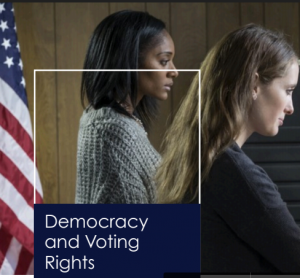 Democracy and Voting Rights (Page 1)
Democracy and Voting Rights (Page 1)
This election is more than a choice between parties and ideologies. An even more fundamental question is at stake: Can we preserve democracy in the face of serious threats to fair elections and fundamental rights?
Questions for Reflection and Candidates
- How do you see democratic values at risk today?
- How do systemic barriers to voting undermine our most sacred democratic values?
- How can your faith community better advocate for stronger voter protections at the state and local level?
- As a candidate, what are your specific plans for protecting and strengthening voting rights?
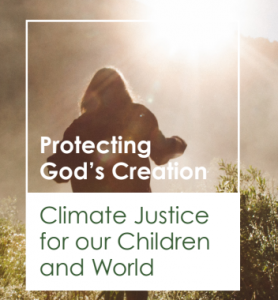 Protecting God’s Creation Climate Justice for our Children and World (Page 2)
Protecting God’s Creation Climate Justice for our Children and World (Page 2)
As people of faith, we believe that responding to the urgent threat of climate change is essential to caring for God’s creation and loving our neighbors. Human activity, primarily the burning of fossil fuels for energy, has thrown
nature out of balance, polluted the air, driven thousands of species of God’s creatures to extinction, intensified catastrophic events such as wildfires and hurricanes, and threatened the lives and livelihoods of our most vulnerable brothers, sisters and neighbors around the world. Scientists tell us we have less than a decade to avoid even more catastrophic consequences.
The United States has a unique responsibility to show moral and political leadership:
- Transitioning our economy away from polluting fossil fuels toward 100% clean energy.
- Honoring the emissions-reduction commitments our nation made at the UN Conference on Climate Change in Paris in 2015, and taking additional actions needed to avert catastrophic global warming.
- Assisting developing nations— who are least responsible for climate change but most impacted by it — in coping with threats such as increased droughts, disease, and sea-level rise by sharing technology and financial support.
Questions for Reflection and Candidates
- What does your faith teach about our responsibilities for the Earth and to others? How are they interdependent?
- Has your faith community made an effort to cut emissions, save energy, or practice environmental stewardship?
- As a candidate, what specific policies do you support to protect God’s Creation and secure a safe climate for our children and future generations?
 Loving Our Immigrant Neighbors (Page 4)
Loving Our Immigrant Neighbors (Page 4)
Scripture repeatedly makes clear that immigrants must be treated with dignity. Policies that rip children from their parents’ arms, lock people away in inhumane conditions, and ban desperate families from entering the country
should keep us awake at night. As people of faith, we believe that the way we treat our immigrant neighbors is a sign of how we treat God.
Questions for Reflection and Candidates
- How can we replace immoral immigration policies that tear families apart and cause trauma with an immigration system that values families and affirms the dignity of allv people?
- What can we do to heal the wounds inflicted on immigrant communities by political rhetoric that portrays them as a dangerous “other?”
- If there are immigrants in our community who are feeling isolated and under threat, how can we show support and build connections?
- As a candidate, what will you do to defend the dignity of all immigrants, and how will you further policies that keep families together?
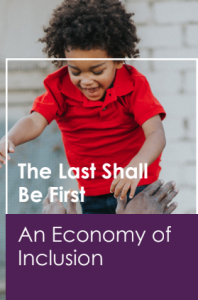 The Last Shall Be First An Economy of Inclusion (Page 5)
The Last Shall Be First An Economy of Inclusion (Page 5)
Our economic systems should work for all Americans, not only the wealthiest few. This is a matter of justice and
human dignity. All religious traditions recognize that charity is essential to care for the most vulnerable, but helping our neighbors in poverty also compels us to address its root causes. “Charity is no substitute for justice withheld,” St. Augustine observed centuries ago.
Questions for Reflection and Candidates
- What can we do to ensure that all Americans are able to provide for their families and live with security and dignity?
- How do we create a just tax system that is fair to all Americans, including working families who are trapped in poverty?
- Why does the United States lag behind most developed countries when it comes to providing paid sick leave and paid family leave?
- As a candidate, what are your specific plans to ensure workers have living wages and economic security while the coronavirus pandemic continues, as well as for the long term?
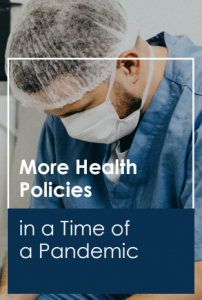 More Health Policies in a Time of a Pandemic (Page 7)
More Health Policies in a Time of a Pandemic (Page 7)
Despite our nation’s stated values of life and equality, the United States is the only industrialized country in the world that does not guarantee its residents universal access to health care. This is a failure of political and moral imagination – especially in a time of pandemic.
Questions for Reflection and Candidates
- How can people of faith be most effective in using our stories, congregations and power to advocate for health care reform?
- What do you struggle with the most when it comes to our healthcare system?
- How has the COVID-19 crisis impacted your community? What policy solutions can keep us all safe and remedy racial and economic inequalities in your community?
- As a candidate, what are your specific plans for making sure that quality,
affordable health care is available for all?
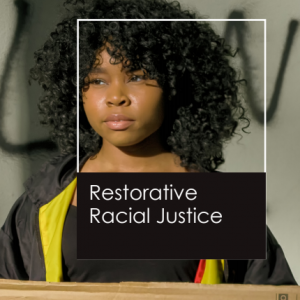 Restorative Racial Justice (Page 9)
Restorative Racial Justice (Page 9)
Justice and redemption are at the very heart of faith. Restorative justice begins with listening to and empowering communities that have been exploited, excluded and denied equal representation and freedom. The evil ideology of
white supremacy shaped our nation from its founding and continues to impact policies and communities today, especially in the criminal justice system. The killings of Ahmaud Arbery, Breonna Taylor, George Floyd and so many other Black people, Indigenous people, and other people of color, has provoked a growing, multi-racial moral movement for accountability and systemic reforms for racial justice.
Questions for Reflection and Candidates
- How can we dismantle the evil ideology of white supremacy in our culture and political systems?
- What can be done to end racial profiling and police violence against people of color?
- What steps can be taken to ensure formerly incarcerated people have voting rights and fair access to employment?
- As a candidate, what will you do to ensure racial justice is prioritized in the criminal justice system?
- How do we build safe communities for everyone, particularly people of color?
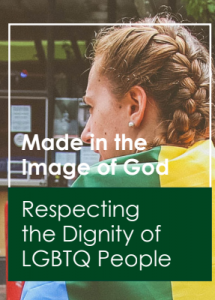 Made in the Image of God: Respecting the Dignity of LGBTQ People (Page 11)
Made in the Image of God: Respecting the Dignity of LGBTQ People (Page 11)
All people have inherent dignity because everyone is created in the image of God. Our gay, lesbian, bisexual and transgender family members, neighbors and co-workers deserve equal rights, and to live without fear or discrimination.
Questions for Reflection and Candidates
- How can your faith community more fully support the equal dignity of LGBTQ people in your state and local area?
- What are the greatest threats to LGBTQ people in your community and the nation?
- As a candidate, what are your specific plans to ensure that LGBTQ people have equal rights and are treated with dignity
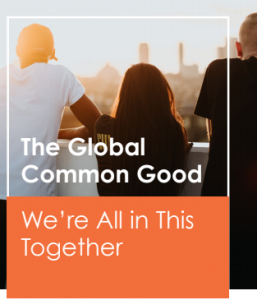 The Global Common Good: We’re All in This Together (Page 12)
The Global Common Good: We’re All in This Together (Page 12)
What does it mean to love our neighbors as ourselves in a globalized world? The health and future of our country and
communities are interconnected to the health and security of other nations. Our fates are bound up in what Rev. Martin Luther King, Jr., called “an inescapable network of mutuality.”
Questions for Reflection and Candidates
- What policies do you think are most important for creating security for your family and community?
- What role should the United States play in the world to help build global peace and security?
- How can your faith community advocate for policies to create a more peaceful world?
- As a candidate, what programs and policies would you prioritize to help build secure communities and a peaceful world?

NM IPL Spring Immersion Retreat Update
/in Actions, Earth & Faith, Faithful Citizenship, Featured Articles, Permian Basin /by adminThe New Mexico Interfaith Power and Light Spring Immersion Retreat over this past weekend brought together people of faith from Albuquerque, Carlsbad, Chaparral, El Paso, San Antonio and Laredo to Southeast New Mexico to learn about oil and gas production and concerns for health and the environment. The group met with frontline community members, viewed illegal methane emissions through a flr camera, prayed, shared concerns and committed to ongoing actions to protect air, water, climate and communities. The next pilgrimage will be in the fall.
Senate Finance Committee Passes Key Community Benefits Fund Initiative
/in Faithful Citizenship, Featured Articles, Green Amendment, NEWS, NM Legislature /by adminThe Community Benefit Fund, Senate Bills 48 and 49, would invest $340 million in communities that have been disproportionately impacted by climate change, providing resources for workforce development and retraining, renewable energy and infrastructure projects, energy efficiency upgrades, and other projects that reduce carbon pollution all while building a sustainable economy.
The Clear Horizons New Mexico Coalition is a partnership of New Mexicans across the state from 33 climate, equity, social justice, and conservation organizations and businesses that are raising their voice in unison for climate action in the Land of Enchantment. At Clear Horizons, we celebrate our promise and commitment to keeping New Mexico beautiful and prosperous for everyone, now and in the future. New Mexico & El Paso Interfaith Power & Light is one of 33 organizations comprising the Clear Horizons coalition. Other partners are 350 New Mexico, American Lung Association in New Mexico, Center for Civic Policy, Coalition for Clean Affordable Energy, Coalition of Sustainable Communities New Mexico, Conservation Voters New Mexico, Creciendo Nuevo Mexico, E2 – Environmental Entrepreneurs, Earthworks, Environmental Defense Fund, GreenLatinos, GRID Alternatives, Healthy Climate New Mexico, Moms Clean Air Force New Mexico chapter, NRDC (Natural Resources Defense Council),, NM CAFe, NM Climate Investment Center, NM Native Vote, NMVC Action Fund, Positive Energy Solar, ProgressNow New Mexico, Prosperity Works, Renewable Energy Industries Association of NM, San Juan Citizens Alliance, Sierra Club Rio Grande Chapter, Sovereign Energy, SWEEP (Southwest Energy Efficiency Project), the Semilla Project, Western Environmental Law Center, Western Leaders Network, and Western Resource Advocates.
IPL-NM-EP Speaks Out Against Congressional Effort to Repeal Methane Safeguard
/in Faithful Citizenship, Featured Articles, NEWS, Permian Basin /by adminThe House & Senate introduced companion Congressional Review Act (CRA) resolutions today that undermine a critical measure to #CutMethane waste and pollution from oil & gas operations.
Their proposed resolutions target a rule implementing the Methane Emissions Reduction Program’s waste emissions charge which calls polluters to be responsible for excessive pollution. The methane polluter fee aims to cut excessive waste, secure American energy, create jobs and only applies to oil and gas companies that do not meet the industry’s own pollution reduction targets.
“People of faith in New Mexico believe that caring for communities, and our sacred water, air and land is an ethical and moral responsibility. For more than 10 years people of faith and conscience in New Mexico have worked for strong methane safeguards.
This is one simple and effective way to make sure that business is responsible. Sister Joan Brown, osf, Community Advocate, New Mexico and El Paso Interfaith Power and Light.